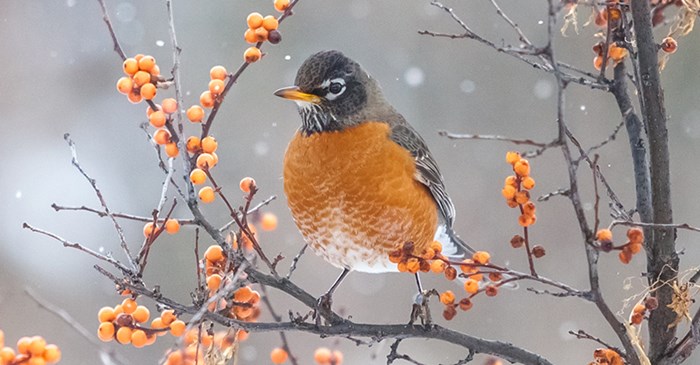When it comes to common wisdom about how birds behave and what they need in the winter, it can be hard to separate fact from fiction. Here, we'll set the record straight about five common bird myths.
Myth No. 1: Robins fly south for the winter
Most people don’t realize the American Robin is a winter resident of the lower 48 states. When cold weather hits, robins are just harder to find. They’re no longer hopping around our lawns and tugging at earthworms — they’re either roosting or foraging for berries and seeds still clinging to wild plants. Despite this, the robin myth does have a grain of truth. If food becomes hard to find, it will do a short-distance migration.
Myth No. 2: Goldfinches are also gone until spring
Actually, goldfinches are still around. In fact, they’re probably feasting on Nyjer seed at your feeder, donning their winter “attire.” In late summer, the male American Goldfinch sheds his bright yellow plumage, and grows in a new set of feathers in a subdued olive-brown, which he keeps until spring. (Females are always olive-brown in color.)
Myth No. 3: Bird feet will freeze on metal perches
Birds don’t fret over frozen feet. First, their feet have little nerve tissue, so clinging to that bare metal won’t really bother them. Also, the feet themselves are composed of tendon, bone and a scale-like covering, so they're not susceptible to frostbite. A better way to help birds ward off the chill factor at your feeding station is to set it up near a wind break, like an evergreen tree or shrub.
Myth No. 4: Bird baths are dangerous for birds in the frozen temperatures
During the winter, it's perfectly safe for birds to be around open water. In fact, even if snow is everywhere, a water source is always a welcome sight. Go ahead and give them fresh water, whether you get a bird bath with a heating element, or just set out a shallow container. This new water source may even attract a new songbird species or two that would otherwise shy away from feeders.
Myth No. 5: If I go on vacation or forget to fill the feeder, the birds will starve
Winter is tough for the songbirds, and the food you set out definitely helps them meet their winter diet and energy needs. Still, if life gets in the way of topping off your feeders, don’t feel guilty. Birds have evolved to be ever-watchful for new food supplies. They’ll continue to forage in wild areas and, of course, they’ll find other feeders to visit!
Fill your feeder with a high-quality mix containing high-energy pieces. Lyric Fruit & Nut High Energy Wild Bird Mix is packed with nuts, seeds and pieces of fruit.
